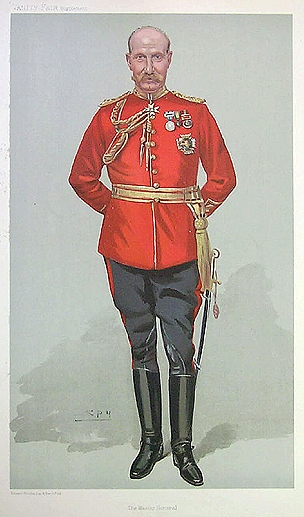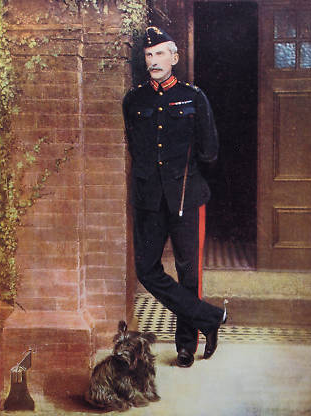Related Research Articles

The Dean Cemetery is a historically important Victorian cemetery north of the Dean Village, west of Edinburgh city centre, in Scotland. It lies between Queensferry Road and the Water of Leith, bounded on its east side by Dean Path and on its west by the Dean Gallery. A 20th-century extension lies detached from the main cemetery to the north of Ravelston Terrace. The main cemetery is accessible through the main gate on its east side, through a "grace and favour" access door from the grounds of Dean Gallery and from Ravelston Terrace. The modern extension is only accessible at the junction of Dean Path and Queensferry Road.

The Most Eminent Order of the Indian Empire is an order of chivalry founded by Queen Victoria on 1 January 1878. The Order includes members of three classes:
- Knight Grand Commander (GCIE)
- Knight Commander (KCIE)
- Companion (CIE)

Field Marshal William Gustavus Nicholson, 1st Baron Nicholson, was a British Army officer who served in the Second Anglo-Afghan War, the Mahdist War, the Third Anglo-Burmese War, the Second Boer War and the First World War. He became Chief of the Imperial General Staff and was closely involved in the reorganisation of the British Army in the early years of the 20th century.

Lieutenant-General Sir William Forbes Gatacre was a British soldier who served between 1862 and 1904 in India and various areas on the African continent. He commanded the British Army Division at the Battle of Omdurman and the 3rd Division during the first months of the Second Boer War, during which time he suffered a humiliating defeat at the Battle of Stormberg.

Lieutenant-General Sir James Wolfe Murray was a British Army officer who served in the Fourth Anglo-Ashanti War, Second Boer War and First World War. He became Chief of the Imperial General Staff three months after the start of the First World War, but was ineffectual and was replaced in September 1915 following the failure of the Dardanelles campaign.

General Sir Henry John Thoroton Hildyard, was a British Army officer who saw active service in the Anglo-Egyptian War of 1882 and the Second Boer War. He was General Officer Commanding-in-Chief, South Africa, from 1905 to 1908.
This is a list of the works of Henry James, an American writer who spent the bulk of his career in Britain.

Augustus is a masculine given name derived from Augustus, meaning "majestic," "the increaser," or "venerable". Many of its descended forms are August, Augusto, Auguste, Austin, Agustin and Augustine. The Greek translation of the title Augustus was Sebastos, from which the name Sebastian descends.
Lieutenant-General Sir Edward Altham Altham, was a British Army officer who served in the Second Boer War and as a senior intelligence officer during World War I. He was Quartermaster-General in India 1917–1919.

Arthur William La Touche Bisset was a Royal Navy officer, active in both World Wars and becoming a noted commander of aircraft carriers and carrier formations in home waters, the Mediterranean and (briefly) the Indian Ocean during the second conflict.
References
- 1 2 3 "BISSET, SIR WILLIAM SINCLAIR SMITH (1843–), in Charles Edward Buckland, Dictionary of Indian Biography, 1906".
- 1 2 England & Wales, National Probate Calendar (Index of Wills and Administrations), 1858-1995, 1916, Aaron-Cuxson
- ↑ "1911 Census Schedules (RG 14/438, Piece 464)". The National Archives.
- 1 2 3 4 "Dod's Peerage, Baronetage, Knightage etc. of Great Britain and Ireland, 1915, page 637".
- ↑ "Henrietta Mary (née La Touche; 1875, ), Lady Bisset". National Portrait Gallery.
- ↑ India, Select Marriages, 1792-1948, FHL Film Number 523862
- ↑ "London Gazette Extraordinary, 14 March 1898, page 1677" (PDF).
- ↑ "Stoke Poges Neighbourhood Plan - Submission Plan 2020-2024" (PDF). Stoke Poges Parish Council. March 2024. p. 55.